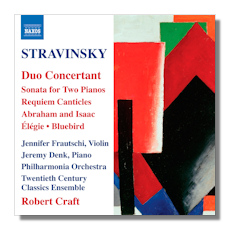
The Internet's Premier Classical Music Source
Related Links
- Stravinsky Reviews
- Latest Reviews
- More Reviews
-
By Composer
-
Collections
DVD & Blu-ray
Books
Concert Reviews
Articles/Interviews
Software
Audio
Search Amazon
Recommended Links
Site News
 CD Review
CD Review
Igor Stravinsky

Late Works
- Duo concertant for Violin and Piano 1
- Sonata for 2 Pianos 2
- Requiem Canticles 3
- Abraham and Isaac 4
- Elégie for Solo Viola 5
- Tchaikovsky/Stravinsky: Bluebird Pas de Deux 6
1 Jennifer Frautschi, violin
1 Jeremy Denk, piano
2 Maarten Van Raat & Ralph van Raat, pianos
3 Roderick Williams, baritone
3 Sally Burgess, mezzo soprano
4 David Wilson-Johnson, baritone
5 Richard O'Neill, viola
3 Simon Joly Chorale
3,4 Philharmonia Orchestra/Robert Craft
6 20th Century Classics Ensemble/Robert Craft
Naxos 8.557532 67:36
This is yet another volume in the ongoing Stravinsky series on Naxos, a major cycle unfolding under the direction of conductor, and one-time close associate of Stravinsky, Robert Craft. The leadoff work here is the 1932 Duo Concertant, a first-rate masterpiece. The rhythmic exuberance of the opening section and the wonderful contrast there and throughout between the two instruments makes this a work you can listen to again and again. The violin is often stately or ethereal or somber, while the piano is generally light and bouncy, save for the slower sections. The performance here by violinist Jennifer Frautschi and pianist Jeremy Denk fully captures the essence of this clever Stravinsky work.
To me, the Sonata for Two Pianos (1943-44) is less successful. It has its moments, of course, and also comes across with a measure of charm, but Stravinsky wasn't Prokofiev or Rachmaninov, and thus didn't quite grasp the piano the way they could. I couldn't help but imagine an orchestral version of the music as I listened, as the textures seemed to cry out for a larger treatment. Well, of course, those familiar with the history of the work know that it was drawn from music originally intended for orchestra. It may have been written to serve as a motion picture score, some have conjectured. At any rate, the music is interesting, if not first-rate Stravinsky, and the performance by Ralph van Raat and Maarten van Veen is fine.
Fine, too, is the performance of Requiem Canticles, a rather dry piece that often wallows in austere choral writing and bassoon-dominated gloom – it is a Requiem, after all. This work, from 1965-66, is late-Stravinsky, which means it was written in his serial phase. The music is not quite as challenging as, say, Schoenberg's twelve-note works, but is nevertheless difficult for the average listener today. That said, it can be a rewarding piece, as its textures are quite transparent, and its music subtle and powerfully atmospheric.
Abraham and Isaac, written a little earlier (1962-63), is of a similar character. The text is sung in Hebrew and tells the familiar story of Abraham following God's command to sacrifice his son Isaac, whom he ends up not sacrificing, of course, as God was merely testing Abraham's loyalty. David Wilson-Johnson sings with utter commitment and the Philharmonia Orchestra under Robert Craft play splendidly. Again, the music will be somewhat challenging but can be engaging to adventurous listeners willing to give it a few hearings.
The Élégie for Solo Viola, from 1944, is a dark work of subtle character. Dedicated to the memory of Pro Arte String Quartet founder, Alphonse Onnou (d. 1940), the somber mood and slow pacing are indeed elegiac and mournful. Richard O'Neill's performance is totally convincing.
The arrangement of four Tchaikovsky pieces from The Sleeping Beauty is a real delight. Stravinsky's take on these little nuggets reduces their instrumentation to a chamber-sized ensemble and gives the music greater transparency and wit. In his informative notes Robert Craft speaks of Stravinsky's "improvement over Tchaikovsky's orchestration", and goes on to talk about the latter's "thickness and clumsiness" in a particular section of the scoring. I think Tchaikovsky's scoring was quite appropriate for his ballet music, and while Stravinsky's arrangement is cleverly conceived, it is merely a different take on the music, but not an improvement on it. Issues like this, however, come down to a matter of opinion, I guess. In any event, the performance by Craft and the Twentieth Century Classics Ensemble is spirited. The sound on all works is excellent. Recommended.
Copyright © 2011, Robert Cummings





















